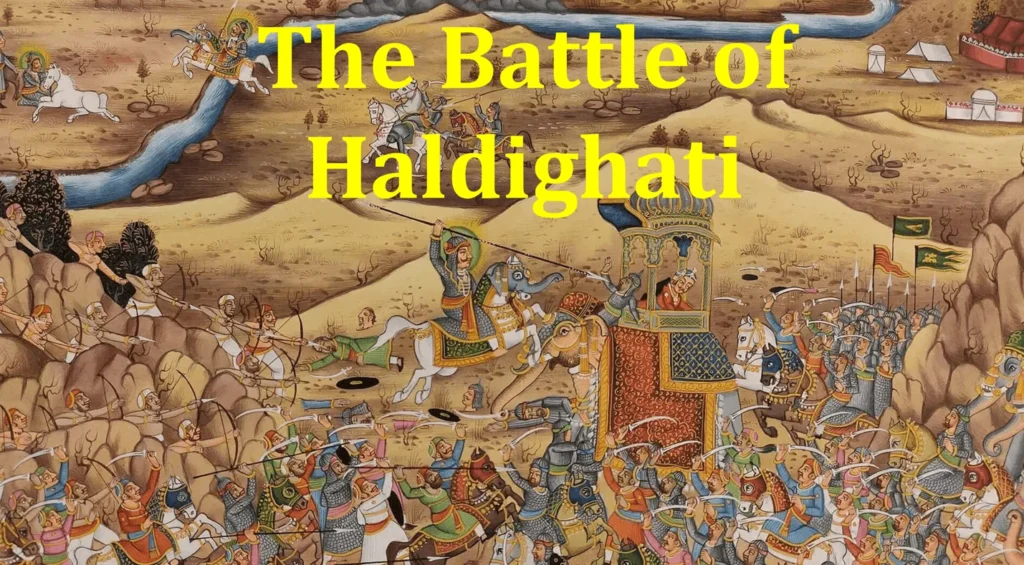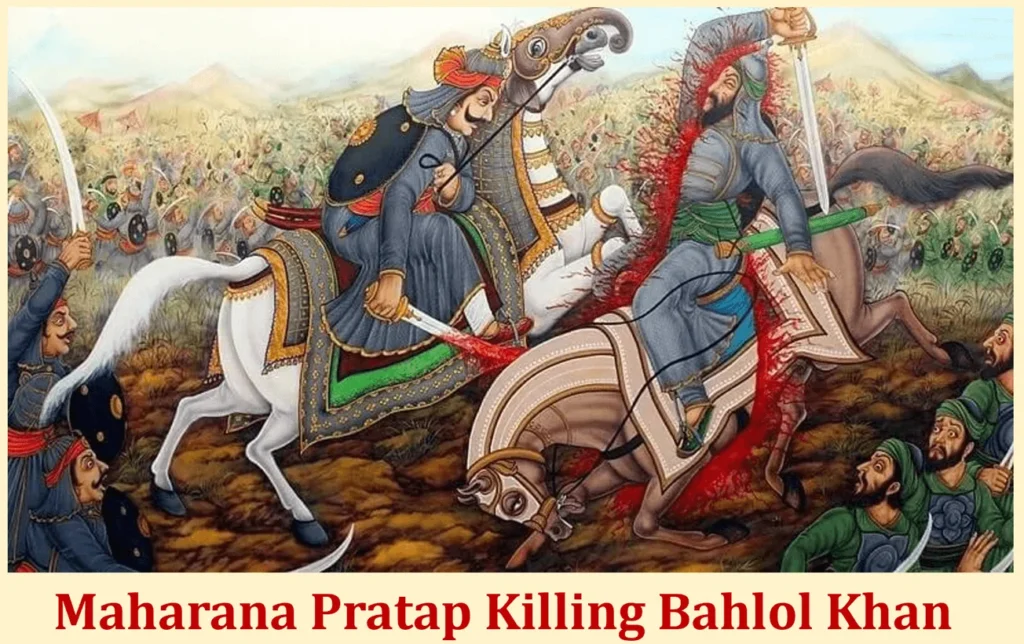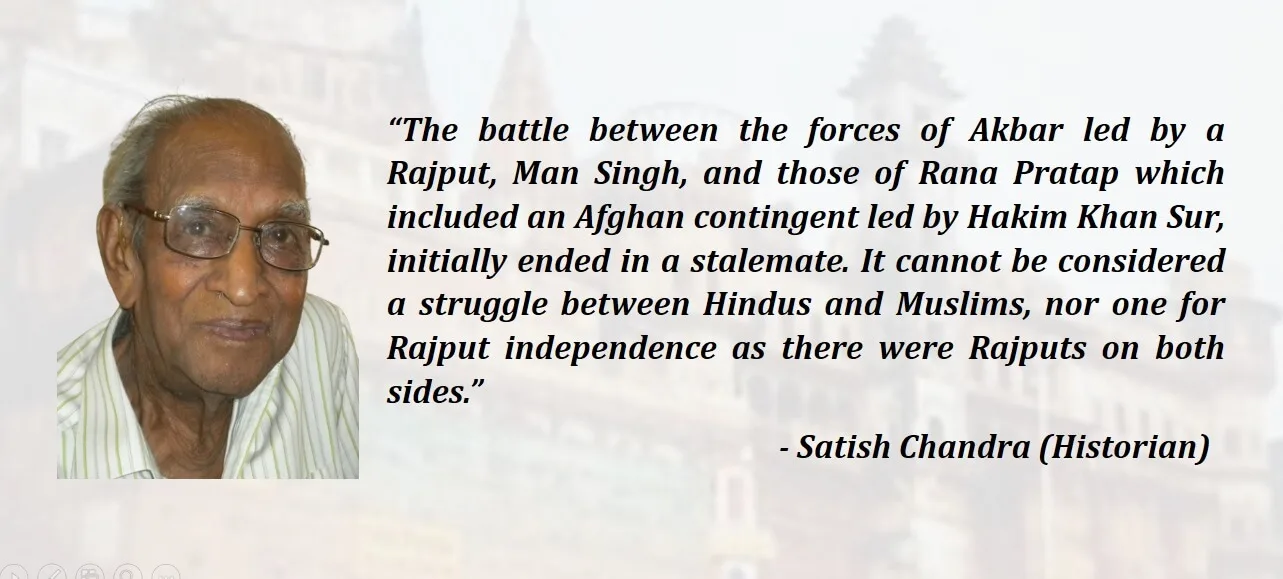
The past is full of events that has direct reflection on the present-day society. One perspective of History is that it is always written with a view of the dominating power of the that time. One such event is the Battle of Haldighati, a historical clash that took place in the past. However, it’s important to clarify that this battle had no direct connection with religion. Various misconceptions are being spread by some political parties in order to seek power. Let’s dive back into the details of this battle and understand why it’s essential to separate historical events from religious connotations.
The Battle of Haldighati
The Battle of Haldighati was fought on June 18, 1576, between the forces of Mewar and Mughals in the Haldighati mountain pass located in present-day Rajasthan. The turmeric-colored soil in this mountain pass gives it the name Haldighati. This venue witnessed one of the greatest battles ever fought in the history of India. The history remains incomplete without the description of this battle which is often remembered due to the valiant efforts of Maharana Pratap, a Rajput ruler of Mewar, and the Mughal forces of Akbar led by his general, Man Singh.

Composition of the armies
Even though most Rajput rulers supported the Mughals, Maharana Pratap too had a strong group of soldiers on his side. This group included Afghan contingent led by Hakim Khan Sur who was the descendent of Sher Shah Suri and other fighters like Ram Singh Tanvar from Gwalior and his sons, the descendants of Jaimal and Patta and a Bhil group led by Rao Poonja.
The Context: Not a Religious Conflict
Despite the fact that Maharana Pratap was a Hindu ruler and Akbar was the Mughal emperor, it’s essential to recognize that the Battle of Haldighati was not fundamentally a religious conflict. The famous historian Satish Chandra expressed his sadness about how history is being used for politics. He hopes that people who believe in freedom and equality will stop this disruptive behavior. The experienced scholar, known for his book about Medieval India, said that a battle between Akbar’s forces led by a Rajput named Man Singh, and Rana Pratap’s forces, which included an Afghan group led by Hakim Khan Sur, ended without a clear winner at first.

He thinks it’s wrong to see this as a fight between Hindus and Muslims or for Rajput independence. Further he adds that there were Rajput and Muslim warriors on both sides. Rather, it was a clash of power, territorial control and differing political ambitions.
At that time, the Mughal Empire was expanding its influence across the Indian subcontinent. The Rajput rulers, like Maharana Pratap, were some of the many regional leaders who resisted Mughal dominance. The battle was a result of tensions arising from conflicting interests, territorial disputes and the quest for power, rather than religious differences.
Differences among historians on the Outcome
Until now, most people agreed that neither side won the battle. Pratap had to back off. Even though the Mughals technically won, they couldn’t keep control of the land and had to retreat too. Dr. Rima Hooja, an archeologist and a historian from Jaipur, looked at different historical writings. She concluded that it’s likely the battle didn’t really have a clear winner. But she also pointed out that the Mughal group couldn’t take over the land they wanted.
Some historians who have strong right-wing beliefs say that because the Mughal army left the battleground, it means they lost the battle which stands contradictory as the fleeing away of Rana Pratap can be traced with the death of his horse “Chetak”. To support their idea, they say that Man Singh got in trouble and couldn’t go to Akbar’s court because he didn’t chase Pratap’s group. They think this shows some kind of defeat. Chandra Shekhar Sharma, who teaches at Government Meera Girls’ College in Udaipur, believes that this was a way of punishing them for losing.
Sharma is one of the people who questions what most people think that Pratap lost the battle, or it was unclear who won. He says that because Akbar had to keep attacking Pratap, it means Akbar’s side didn’t do well at Haldighati. According to Sharma, Pratap distributed land to the people of Mewar, which was possible only for a ruler to do so. All these arguments are just the representation of the views of different sides basically aiming the politicization of the glorious event. Finally, the views of Satish Chandra (a well-known historian) and Rima Hooja are alike, that the battle didn’t really have a clear result.
Legacy and Misconceptions
The place which Battle of Haldighati has secured in India’s history and culture is everlasting. It motivates the Indians and people still remember Maharana Pratap for his bravery, courage and his determination to keep his kingdom and people safe. This makes him a symbol of fighting back against being treated badly. But as years went by, some leaders were successful in misguiding the innocent people. They started illustrating that it as the battle fought between two different communities which was never the underlying truth.
The Importance of Accurate Interpretation
The sense of accuracy and open-mindedness is the only essence of reading and interpreting the historical events. Whatever happened in history cannot be changed and it is the bitter truth. So, one must learn to look towards future learning from the past. Misattributing religious motives to conflicts like the Battle of Haldighati oversimplifies complex situations and can perpetuate misunderstandings among different communities. By understanding the true nature of events, we can foster better communication and collaboration among diverse groups.
Moral of the Story
Maharana Pratap’s bravery and determination had no match. This makes the Battle of Haldighati an unforgettable chapter in the Indian history. In the era of Illusory truth effect, it is essential to remember that the battle had no religious confrontation. Rather it was simply a conflict between retaining the sovereignty of the kingdom for Pratap and proving his dominance for Akbar. Thus, in order to prevent the repetition of history of slavery and conflict. The framers of the constitution decided to keep the religion away from the administration of the country. And thus declared India as a secular country. Now it is our fundamental duty to maintain the integrity of the nation with our intellect. We should not get carried away with the misleading information and become like a herd of goats and sheep which are always slaughtered.
Stay awake and stay informed!

Good
Good information
Very informative article
I salute to the patriotism of Maharana Pratap.
Very interesting and informative article
This is a funny, baseless logic that because people with various religious identity fought in both side, this war was only political.
The throne on which Akbar ascended , based on what ? Let not bring the history of temples destroyed by Akbars ancestors or even during his time.
People might forget that Akbar was called “Gazi” because he killed qafir king. I challenge the writer or any historian to rebut that. In every country and time when two sides clashes there are some natural allies and there are allies who are essentially my enemies enemy is my friend.
Historians in India somehow suffers from an unexplained dementia or psychological problem.
Portray history as it is. There is need to apply own logic.